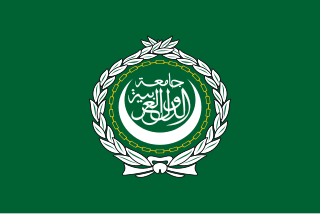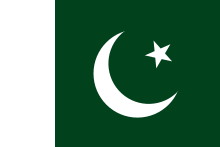
The Organisation of Islamic Cooperation, formerly the Organisation of the Islamic Conference, is an intergovernmental organization founded in 1969, consisting of 57 member states, with 48 being Muslim-majority countries. The organisation states that it is "the collective voice of the Muslim world" and works to "safeguard and protect the interests of the Muslim world in the spirit of promoting international peace and harmony".

Sushma Swaraj was an Indian lawyer and politician, who served as the Minister of External Affairs of India in the first Narendra Modi government from 2014 to 2019. She was the second person to complete a 5-year term as the Minister of External Affairs, after Jawaharlal Nehru. A senior leader of the Bharatiya Janata Party (BJP), Swaraj was the second woman to hold the office of Minister of External Affairs, after Indira Gandhi. She was elected seven times as a Member of Parliament and three times as a Member of the Legislative Assembly. At the age of 25 in 1977, she became the youngest cabinet minister of the Indian state of Haryana. She also served as 5th Chief Minister of Delhi for a short duration in 1998 and became the first female Chief Minister of Delhi.

Pakistan–Tunisia relations refer to bilateral relations between Pakistan and Tunisia. A number of framework agreements have been concluded between Pakistan and Tunisia in the spheres of trade, tourism, culture, information and industries. Both countries are members of the Organisation of Islamic Cooperation, Non-Aligned Movement and Group of 77. Pakistan has an embassy in Tunis and Tunisia has an embassy in Islamabad.

Sartaj Aziz was a Pakistani economist and strategist, who had previously served as the deputy chairman of the Planning Commission of Pakistan, member of the federal cabinet as the de facto Minister for Foreign Affairs, a Federal Senator as well as the National Security Advisor.

Arab-Pakistan relations refer to foreign relations between Pakistan and the various states of the Arab world which constitute the Arab League.
The Fourth Extraordinary Session of the Islamic Summit was a conference organised by the Organisation of Islamic Cooperation (OIC) in Mecca on 14 and 15 August 2012. The venue of the conference was Al Safa Palace.
The foreign policy of the Modi government is associated with the policy initiatives made towards other states by the current government of India after Narendra Modi assumed the office of prime minister on May 26, 2014.
The 2014 SCO summit was the 13th annual summit of heads of state of the Shanghai Cooperation Organisation held between 11 and 12 September in Dushanbe, Tajikistan. Security was among the top issues for 13th annual summit and all members during the last meeting reached a consensus on fighting against separatism, extremism and terrorism, as well as on safeguarding regional peace and security therefore Afghanistan will be focal point during talks in Dushanbe, claim some diplomats of member countries.

Sushma Swaraj was the Indian External Affairs Minister under Prime Minister Narendra Modi from May 2014 till May 2019, responsible for implementing the foreign policy of Narendra Modi. She is only the second women to hold this position after Indira Gandhi.
The Middle East region plays a vital role in India's economy as it supplies nearly two-thirds of India's total oil import, bilateral trade is also flourishing in recent years particularly with UAE and other Arab states of the Persian Gulf. Over the years, millions of Indians mostly working class have migrated to the Persian Gulf region looking for jobs and they account for a sizeable share in the total remittances received from abroad. Indian External Affairs Ministry refers the region as West Asia and not as Middle East which is a more popular attribution, particularly in the Western countries.

Neighbourhood First Policy of India is a core component of India's foreign policy. It focuses on peaceful relations and collaborative synergetic co-development with its South Asian neighbours of the Indian subcontinent encompassing a diverse range of topics, such as economics, technology, research, education, connectivity, space program, defence security, environment and climate challenge. This policy creates new avenues as well as leverages to the existing regional cooperation initiatives such as SAARC, SASEC, BBIN, and BIMSTEC. It compliments India's Look East policy focused on Southeast Asia and Look West Policy focused on Middle East.
International reactions to the Saudi-led intervention in Yemen of 2015 were mixed. Most other Arab League nations and several Western governments backed the Saudi Arabia-led military coalition, but other governments warned against an escalation in the violent situation in Yemen.

The Islamic Military Counter Terrorism Coalition (IMCTC) is an intergovernmental counter-terrorist military alliance between 41 member states in the Muslim world, united around the war against the Islamic State and other counter-terrorist activities. Its creation was first announced by Saudi Arabian defence minister Mohammad bin Salman Al Saud, on 15 December 2015. The alliance was to have a joint operations center in Riyadh, Saudi Arabia.

The 2016 Uri attack was carried out on 18 September, 2016 by four Jaish-e-Mohammed militants from Pakistan against an Indian Army brigade headquarters near the town of Uri in the Indian Jammu and Kashmir. 19 Indian soldiers were killed in the attack, and 19–30 others were injured. It was reported by the BBC as having been "the deadliest attack on security forces in Kashmir in two decades".

The General debate of the seventy-second session of the United Nations General Assembly (UNGA) commenced on 19 September 2017 and ended on 25 September 2017. Leaders from a number of member states addressed the UNGA.
The Sixth Extraordinary Session of the Islamic Summit was a conference organized by the Organisation of Islamic Cooperation (OIC) in Istanbul on 13 December 2017. This summit resulted "Istanbul Declaration on Freedom for Al Quds."

The 2019 India–Pakistan border skirmishes were a series of armed clashes consisting of cross-border airstrikes and exchanges of gunfire between India and Pakistan across the de facto border in the disputed Kashmir region, which is subject to extensive territorial claims by both countries.

The Council of Foreign Ministers, formerly known as Islamic Conference of Foreign Ministers, is the main decision-making body of the Organisation of Islamic Cooperation consisting one representative from each member states of the OIC. It is the largest decision-oriented intergovernmental organization that holds conferences every year called Islamic Summit pertaining to the issues concerning Muslim nations and the OIC's agenda. The 48th summit is scheduled to be held in Islamabad, Pakistan on 22 March 2022.

The Independent Permanent Human Rights Commission is a human rights agency and one of the principal organs of the Organisation of Islamic Cooperation advocating for human rights within the scope of its 57 member states. It takes activities as an independent commission of the OIC and also advises its policymaking bodies and decision-making authority within the framework of human rights and fundamental rights.

Islamic Summit of the Organisation of Islamic Cooperation is one of the five highest decision-making bodies of the OIC, the other four being the OIC Council of Foreign Ministers, Standing Committees, Executive Committee, and the International Islamic Court of Justice. The Islamic Summit is a principle organ of the OIC focused on formulation, development, and implementation of decisions made by 57 member states. The Summit is attended by the concerned heads of state such as prime ministers, presidents, emirs and other equivalent heads.












